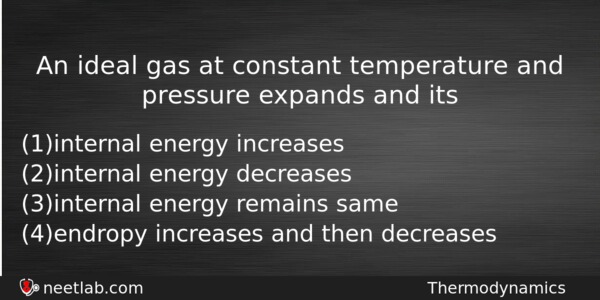| ⇦ | 
| ⇨ |
An ideal gas at constant temperature and pressure expands and its
Options
(a) internal energy increases
(b) internal energy decreases
(c) internal energy remains same
(d) endropy increases and then decreases
Correct Answer:
internal energy remains same
Explanation:
Internal energy change (ΔE) is a function of temperature. So for constant temperature, ΔE is also zero i.e., internal energy remains same. [ΔE ∝ T]
Related Questions: - The total number of electrons present in all the p-orbitals of bromine is
- Which of the following anions is present in the chain structure of silicates
- For electron affinity of halogens, which of the following is correct?
- Which of the following exists as zwitter ion
- K₂Cr₂O₇ on heating with aqueous NaOH gives
Topics: Thermodynamics
(179)
Subject: Chemistry
(2512)
Important MCQs Based on Medical Entrance Examinations To Improve Your NEET Score
- The total number of electrons present in all the p-orbitals of bromine is
- Which of the following anions is present in the chain structure of silicates
- For electron affinity of halogens, which of the following is correct?
- Which of the following exists as zwitter ion
- K₂Cr₂O₇ on heating with aqueous NaOH gives
Topics: Thermodynamics (179)
Subject: Chemistry (2512)
Important MCQs Based on Medical Entrance Examinations To Improve Your NEET Score
18000+ students are using NEETLab to improve their score. What about you?
Solve Previous Year MCQs, Mock Tests, Topicwise Practice Tests, Identify Weak Topics, Formula Flash cards and much more is available in NEETLab Android App to improve your NEET score.
Share this page with your friends

Leave a Reply